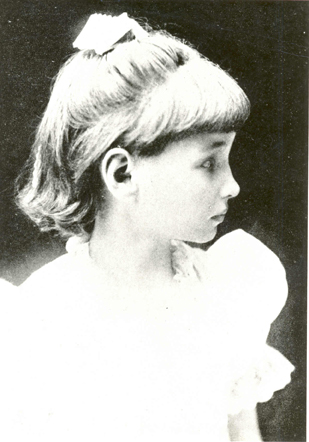In The Approach of Christmas Helen Keller vividly describes an early childhood memory of Christmas. It was December 1887, a momentous year for Helen Keller. In March of that year Anne Sullivan came to Tuscumbia, Alabama to teach Helen. Just a few weeks later, Anne successfully taught her young pupil to communicate using the manual sign language. Helen was just six years old.
Many years later, Helen described the joy of her "first" Christmas in December of that year, as well as her subsequent bewilderment and outrage as she discovered inequality in the world.
"Tell us about your happiest Christmas." Do you say? These words send my thoughts flying back to the time when the word Christmas was first spelled into my hand. I was just beginning to be conscious of myself, most experience was one splendid bud. After indescribable darkness, silence and vain longing the happiness of childhood had flashed upon me — love had breathed a new life into me, and on that birthday of the Giver of life to all men I was a living soul!
The Christmases before that day— six of them— were a blank. Not that I had no gifts, but I could not distinguish them from anything else in the house. I did not know what was mine, or what was other people’s. I had no wish for anything, except food and objects that were taken from my hands because I might break or spoil them. If the family hid any presents from me, I did not know or care. I was not a child, I was a wayward, elfish (sic.) little animal with no language but a cry. My dog was only something that got in the way. I did not even realize that I loved any one or cared for anything…
I was nearly seven years old when my teacher came to me, so my first Christmas came in my eighth year. In memory it stands out vividly— the jump out of bed, waking everybody with a "Merry Christmas!" spelled by my hand, a hurried toilet, impatient waiting for others, a flurry of preparation for the family party after breakfast, and my incessant questions about everything.
How full the air was of secrets and mysteries! How tantalizing were the odors of gifts hidden away from my prying fingers— oranges, candies, pretty new toys. I do not think any child ever plotted more surprises or gave away more secrets or received more delightful gifts than I did on that beautiful Christmas day in the land of mocking-birds and roses.
I even insisted on giving something to my dog, Belle. I tied on her neck a big Christmas bow that she did not appreciate. She was a setter, and very fond of hunting birds. In the afternoon she skipped off on a private excursion, and when she came back, lo! The bow was in a sorry plight, it had been dipped in the creek, and was full of burs and sadly bedraggled.
The red letter event of that first Christmas was a tree to which the school children of my home town invited me. When I found myself caught in the tangle of its fragrant embrace, I clapped my hands. I felt the presents hanging on every branch and twig. When I was told that each child would have a gift I was so delighted that the people in charge let me hand the parcels to the children.
There were many presents for me, and I was overjoyed with them. For the first time, I was feeling a child’s pleasure in owning things, in getting them.
But as I danced about, showing off my new possessions, I ran against a child in a corner— and as I touched her, I discovered that she had no present. She had been forgotten. I insisted on giving her my toys. Afterwards I was told that she received no present because she was poor.
I had thought that everybody would be happy and get something good at Christmas. The next few days I bombarded my teacher with questions. "Why is she poor?" I demanded. "Why has god given me so much and her nothing " There was hot resentment in my heart against a God who, I thought, was so cruel to her.
Of course I did not have words to express all these feelings. But the little girl that had no gifts brought a real shock to my idea of a happy Christmas for everybody. And I think now that my childish feeling discovered a real fault in that first and happiest of all my Christmases.
While there are gifts for some and disappointments for others no Christmas can be perfect. While there are children who must go hungry on Christmas day no true follower of Christ can enjoy his Christmas dinner. If we would work for the world’s happiest Christmas we must strive to order the society in which we live so that none will go through life empty handed, without gifts. For only when all men have a just share in the bountiful gifts of God and the fruits of their own labor will Christmas be a fit celebration for the messenger of brotherhood among men.
